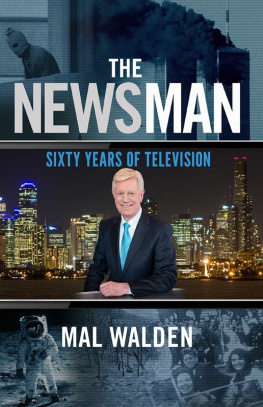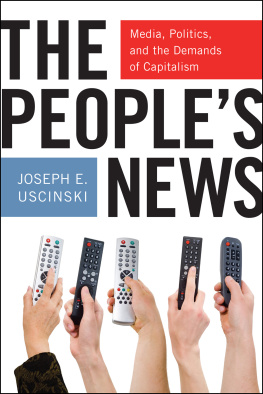Cover: iStock by Getty Images
Published by State University of New York Press, Albany
2019 Kimberly Meltzer
All rights reserved
Printed in the United States of America
No part of this book may be used or reproduced in any manner whatsoever without written permission. No part of this book may be stored in a retrieval system or transmitted in any form or by any means including electronic, electrostatic, magnetic tape, mechanical, photocopying, recording, or otherwise without the prior permission in writing of the publisher.
For information, contact State University of New York Press, Albany, NY
www.sunypress.edu
Library of Congress Cataloging-in-Publication Data
Name: Meltzer, Kimberly, author.
Title: From news to talk : the expansion of opinion and commentary in US journalism / Kimberly Meltzer.
Description: Albany : State University of New York Press, [2019] | Includes bibliographical references and index.
Identifiers: LCCN 2018020074 | ISBN 9781438473499 (hardcover : alk. paper) | ISBN 9781438473505 (ebook)
Subjects: LCSH: JournalismObjectivityUnited States. | JournalistsUnited StatesAttitudes.
Classification: LCC PN4888.O25 M455 2019 | DDC 302.23dc23
LC record available at https://lccn.loc.gov/2018020074
10 9 8 7 6 5 4 3 2 1
For Evan, Natalie, and Jocelyn
Preface
O ver the past ten years, news organizations of all types have been producing more commentary and opinionwhat I construe as talk. Professional punditry has proliferated on television in the past decade. It is a less expensive alternative to scripted news and it still attracts viewers. The talking heads found across television news are more than readily available and often participate without financial compensation (Farhi, 2016). The move toward talk within TV news programs, and the increase in opinion and commentary in other types of news, is also an attempt to provide the value added for audience members who have many sources of the same news to choose from. The additional personalities, opinions, debate of viewpoints, and expertise can distinguish an outlets news coverage of a story from its competitors. The movement toward talk also feeds the cycle of individual brand creation and management by big-name journalists (Farhi, 2014). As audiences for traditional TV news broadcasts continue to dwindle, cannibalized by newer information venues and technologies, the movement of some of the most well-known news personalities from news programs to talk shows represents a shift in the prestige of televised news and talk. It also affirms the blending of news and entertainment and the fluidity and transferability of individual TV personalities. The increasing presence of presidents, political candidates, and others regarded as authority figures, on television talk shows also helps to elevate the formats status. A media environment which will increasingly contain automated newsnews stories generated and written by computer algorithmsis another reason why talk will be increasingly present; it could be one of the only things distinguishing robot journalists from human ones (Keohane, 2017; Levy, 2012).
Recent years have also seen the strategy by some news networks to expand the definition of news by adding other types of programs. We have also seen the creation of many online news sites started by star journalists who made a name for themselves at more traditional news organizations before leaving to begin their own enterprises. Another aspect of the increase in opinion and commentary in news is how journalists are dealing with the ability of news consumers to talk back to their stories in the form of comments on news websites and elsewhere.
As a journalism scholar who once worked in TV news in New York and Atlanta, and for local and regional newspapers, I have observed the movement toward talk in news. This book follows logically from my previous book (Meltzer, 2010) which tracked journalistic adaptation to television technology from the 1950s through 2009 and which left off with suggestions for predicting how journalism and television news would continue to evolve. It is also an outgrowth of ideas that have percolated through discussions in the courses I have taught over the past ten years in the Washington, DC area at Marymount University and Georgetown University.
In this book, From News to Talk , the technological, economic, cultural, and political forces affecting the movement toward opinion, commentary, and talk in television, online, print, and radio news are examined. This is accomplished through interviews with over 30 journalists and other industry professionals, and analysis of popular, trade, and organizational publications and proceedings about opinion, commentary, and talk in news. The interviews include key figures in journalism. The analysis centers around several key case studies of this movement toward opinion and commentary in news, including on TV with the increase in opinionated talking heads and the ushering in of a new era of talk and entertainment programs, the strategy by CNN to broaden its definition of news by adding non-news programs, and online and mobile news with the bevy of star journalists starting their own self-branded sites.
While this book focuses on contemporary cases of moves toward talk, it necessarily provides an historical tracing of opinion and commentary in television, print, radio, and online news. TV news even in its purest form was fundamentally based on talk. The news anchors and reporters tell us the story. They talk to us at home. According to Scannell (1996, in Thornborrow and Montgomery, 2010):
Sociability is the most fundamental characteristic of broadcastings communicative ethos [] To describe the communicative manner and style of radio and television as conversational means more than chatty mannerisms and a personalized idiom. It means orienting to the normative values of ordinary talk in which participants have equal status and equal discursive rights [] The communicative task that broadcasters faced was to find forms of talk that spoke to listeners, modes of address which disclosed that listeners were taken into account in the form of the utterance itself [] [R]adio and televisions communicative style was first found in the development of friendlier forms of address, a more informal discursive style as markers of a general sociable intent that showed itself in most areas of programme output. (1996: 2324)
Thornborrow and Montgomery (2010: 101) write that The very fact that, in broadcasting, audiences may easily disengage from the message places a considerable onus on the broadcaster to sustain their interest.
Therefore, in the shift from news to talk, the delivery of information through the spoken word is not what varies, but it is a shift in what the talk is about, and the manner in which it is delivered. It is also not as though talk and other non-news elements did not always exist to some extent within television news. Katz has argued that television has long included opinion and interpretation, and it was when television news far eclipsed newspaper news as the main source of daily information, causing the newspapers to respond, as tabloids do, by becoming more like television through the highlighting of opinion and interpretation (Katz, 2009: 12). Ben-Porath (2007) refers to the increase in conversational news as a rise in dialogical news, and Cushion (2015) views it through the lenses of mediatization and journalistic interventionism, marking a shift from edited to live reporting, focusing on the two-way convention in political coverage and the more interpretive approach to journalism it promotes.








